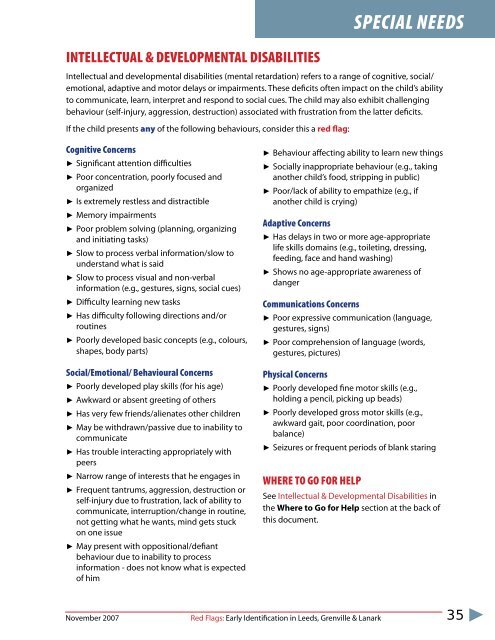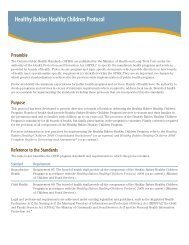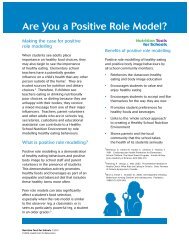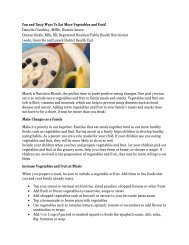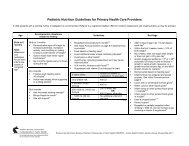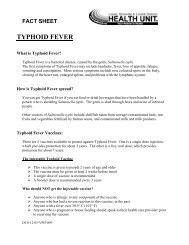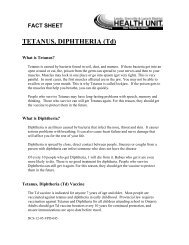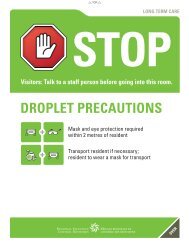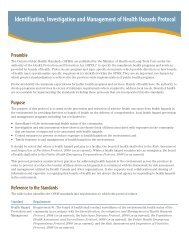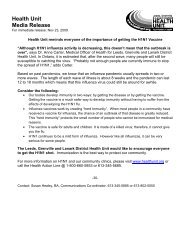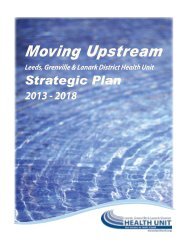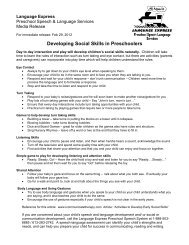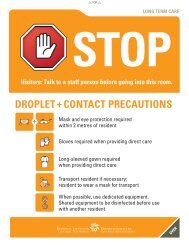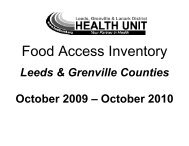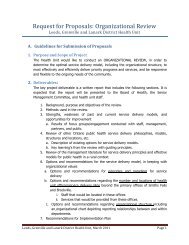Red Flags â - Leeds, Grenville and Lanark District Health Unit
Red Flags â - Leeds, Grenville and Lanark District Health Unit
Red Flags â - Leeds, Grenville and Lanark District Health Unit
You also want an ePaper? Increase the reach of your titles
YUMPU automatically turns print PDFs into web optimized ePapers that Google loves.
SPECIAL NEEDS<br />
INTELLECTUAL & DEVELOPMENTAL DISABILITIES<br />
Intellectual <strong>and</strong> developmental disabilities (mental retardation) refers to a range of cognitive, social/<br />
emotional, adaptive <strong>and</strong> motor delays or impairments. These deficits often impact on the child’s ability<br />
to communicate, learn, interpret <strong>and</strong> respond to social cues. The child may also exhibit challenging<br />
behaviour (self-injury, aggression, destruction) associated with frustration from the latter deficits.<br />
If the child presents any of the following behaviours, consider this a red flag:<br />
Cognitive Concerns<br />
►► Significant attention difficulties<br />
►► Poor concentration, poorly focused <strong>and</strong><br />
organized<br />
►► Is extremely restless <strong>and</strong> distractible<br />
►► Memory impairments<br />
►► Poor problem solving (planning, organizing<br />
<strong>and</strong> initiating tasks)<br />
►► Slow to process verbal information/slow to<br />
underst<strong>and</strong> what is said<br />
►► Slow to process visual <strong>and</strong> non-verbal<br />
information (e.g., gestures, signs, social cues)<br />
►► Difficulty learning new tasks<br />
►► Has difficulty following directions <strong>and</strong>/or<br />
routines<br />
►► Poorly developed basic concepts (e.g., colours,<br />
shapes, body parts)<br />
Social/Emotional/ Behavioural Concerns<br />
►► Poorly developed play skills (for his age)<br />
►► Awkward or absent greeting of others<br />
►► Has very few friends/alienates other children<br />
►► May be withdrawn/passive due to inability to<br />
communicate<br />
►► Has trouble interacting appropriately with<br />
peers<br />
►► Narrow range of interests that he engages in<br />
►► Frequent tantrums, aggression, destruction or<br />
self-injury due to frustration, lack of ability to<br />
communicate, interruption/change in routine,<br />
not getting what he wants, mind gets stuck<br />
on one issue<br />
►► May present with oppositional/defiant<br />
behaviour due to inability to process<br />
information - does not know what is expected<br />
of him<br />
►► Behaviour affecting ability to learn new things<br />
►► Socially inappropriate behaviour (e.g., taking<br />
another child’s food, stripping in public)<br />
►► Poor/lack of ability to empathize (e.g., if<br />
another child is crying)<br />
Adaptive Concerns<br />
►► Has delays in two or more age-appropriate<br />
life skills domains (e.g., toileting, dressing,<br />
feeding, face <strong>and</strong> h<strong>and</strong> washing)<br />
►► Shows no age-appropriate awareness of<br />
danger<br />
Communications Concerns<br />
►► Poor expressive communication (language,<br />
gestures, signs)<br />
►► Poor comprehension of language (words,<br />
gestures, pictures)<br />
Physical Concerns<br />
►► Poorly developed fine motor skills (e.g.,<br />
holding a pencil, picking up beads)<br />
►► Poorly developed gross motor skills (e.g.,<br />
awkward gait, poor coordination, poor<br />
balance)<br />
►► Seizures or frequent periods of blank staring<br />
WHERE TO GO FOR HELP<br />
See Intellectual & Developmental Disabilities in<br />
the Where to Go for Help section at the back of<br />
this document.<br />
November 2007<br />
<strong>Red</strong> <strong>Flags</strong>: Early Identification in <strong>Leeds</strong>, <strong>Grenville</strong> & <strong>Lanark</strong><br />
35


